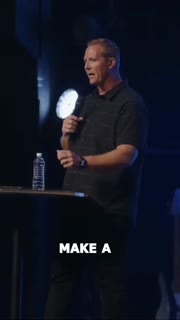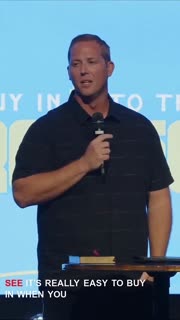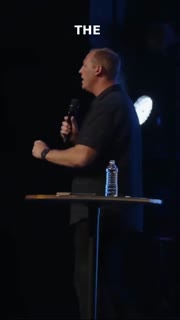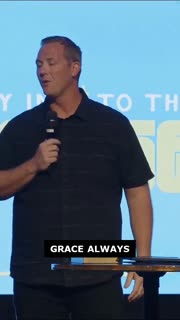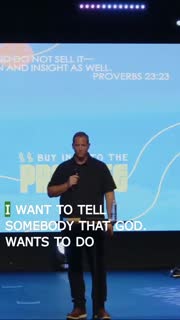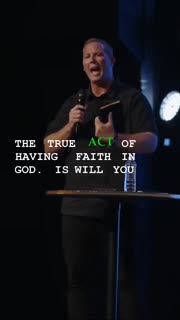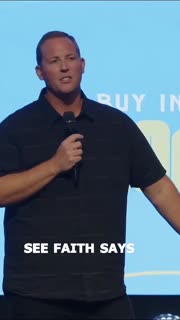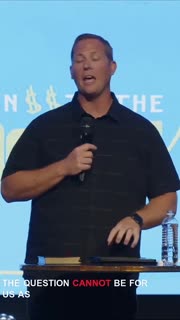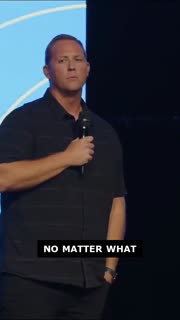Faithful Investment in God's Promises Amidst Trials
Devotional
Sermon Summary
Bible Study Guide
Sermon Clips
1. "So I want to make a declaration today over your life. And I want you to receive this. I want this to be your mindset. Is that the promise is coming. The promise is coming. In this instance, Jeremiah finds himself at a place where he is in prison. Now he's not in a nice jail cell with three meals a day and a roof over his head. He is. He is in the palace dungeon. He is sitting down low." [02:31] (31 seconds)
2. "See it's really easy to buy in when you know the outcome. And you can see the light. And you're going to see the market tick up. And you know that there's going to be a great return on your investment. But when it's not easy. Is 70 years. When you're on the doorstep of 70 years of captivity of the Babylonians. And that's exactly where they found themselves. Jeremiah was at a place where. He was completely surrounded. The land had no future. And it looked like it had no hope. But he was told. To buy it anyways." [06:17] (31 seconds)
3. "Grace is the ability to do something. That you couldn't do by yourself. And I want to tell somebody. That you're in a pit. In a place you might have even gotten yourself in. But the good news is. Is there's something called the grace of God. And if you hold on to. If you listen to the word of the Lord. I want to tell somebody. That grace is on the way. That no you can't get out yourself. And your gift. Isn't going to get you out of this place. And your wit isn't going to be the answer." [08:00] (34 seconds)
4. "Grace always shows up. With action. Everybody say action. Grace shows up with action. Grace showed up and said. Hey I've got a deal. I've got an opportunity. And now is the time for you to step up. Buy in. And sign the deal. See grace always shows up with hope on the other side. Grace shows up and says. Your present situation. Is not going to be your permanent situation. Grace shows up and says. You know what? There is a future. Grace shows up and says. There is a hope." [10:02] (35 seconds)
5. "I want to tell somebody that God. Wants to do something incredible in your life. And he's got promises. Some of you in this room have promises. That you've forgotten about. Promises that you haven't bought into yet. And we have to be careful. Not to buy into our present time. Don't buy into what we're experiencing. But we've got to buy into. His present time. His promises. And I want to tell somebody. It is not time. We're not called to as a church. To rent his promises. You are not a tenant. That is your inheritance." [11:37] (40 seconds)
6. "The true act of having faith in God. Is will you buy into it when things are difficult. When things stink. When there is no hope. Will you buy into it. And as a church. Here's the problem. We have got to buy in. While everybody else is selling out. You've got to buy in. Why it's difficult. Because when you buy in. Not only is grace coming. But victory is on its way." [13:15] (33 seconds)
7. "See faith says God. I know that right now. I'm weeping over this. This issue. This moment. This land. This territory. This promise. This marriage. This child. This job. I'm weeping now. But I'm buying into the promise. That me and my household will be saved. I'm buying into the promise. That I will live abundantly through the grace of God. I'm going to buy into the promise. That everything's not lining up like I want it to now. But I will see the goodness of God in the land of the living." [14:41] (39 seconds)
8. "The question cannot be for us as believers. How long will my suffering last? My question to you is. How long will you last? Through your suffering? How long will you buy in? And not sell out? How long will you hold on to what God has for you? See so many people sell out. Because they say all the time. You have no idea how much pain is in my past. And they give up. You have no idea what I've been through or what I've done. You don't know what my nights look like. You don't know what I've dealt with in my past." [16:00] (35 seconds)
9. "I want to tell somebody, build some houses, get to work, do what God's called you to do. Stop shutting your doors and hiding and saying, we're just going to wait this thing out. How about you have some children? I got an amen on that one. I knew I would. Have some children. Amen. Multiply. Don't decrease, but what? Increase. Don't complain about things. Don't complain about the government. Run for office. Come on, somebody. Don't talk about people. How about you go knock on their door and say, can I share you about Jesus?" [22:29] (43 seconds)
10. "No matter what you've been going through, buy into the promise that God has spoken over your life. Everything that you've gone through, it's just part, everybody say part, of the testimony that's going to give God glory. Somebody needs to hear that in the room today. It's part of the testimony. It's a building block to the future and the promised land that God has for you. And no matter how bad things get, no matter what wall you hit, I just pictured Jeremiah in this pit. The only place he can look up to the left wall." [25:02] (50 seconds)
Ask a question about this sermon
2. "See it's really easy to buy in when you know the outcome. And you can see the light. And you're going to see the market tick up. And you know that there's going to be a great return on your investment. But when it's not easy. Is 70 years. When you're on the doorstep of 70 years of captivity of the Babylonians. And that's exactly where they found themselves. Jeremiah was at a place where. He was completely surrounded. The land had no future. And it looked like it had no hope. But he was told. To buy it anyways." [06:17] (31 seconds)
3. "Grace is the ability to do something. That you couldn't do by yourself. And I want to tell somebody. That you're in a pit. In a place you might have even gotten yourself in. But the good news is. Is there's something called the grace of God. And if you hold on to. If you listen to the word of the Lord. I want to tell somebody. That grace is on the way. That no you can't get out yourself. And your gift. Isn't going to get you out of this place. And your wit isn't going to be the answer." [08:00] (34 seconds)
4. "Grace always shows up. With action. Everybody say action. Grace shows up with action. Grace showed up and said. Hey I've got a deal. I've got an opportunity. And now is the time for you to step up. Buy in. And sign the deal. See grace always shows up with hope on the other side. Grace shows up and says. Your present situation. Is not going to be your permanent situation. Grace shows up and says. You know what? There is a future. Grace shows up and says. There is a hope." [10:02] (35 seconds)
5. "I want to tell somebody that God. Wants to do something incredible in your life. And he's got promises. Some of you in this room have promises. That you've forgotten about. Promises that you haven't bought into yet. And we have to be careful. Not to buy into our present time. Don't buy into what we're experiencing. But we've got to buy into. His present time. His promises. And I want to tell somebody. It is not time. We're not called to as a church. To rent his promises. You are not a tenant. That is your inheritance." [11:37] (40 seconds)
6. "The true act of having faith in God. Is will you buy into it when things are difficult. When things stink. When there is no hope. Will you buy into it. And as a church. Here's the problem. We have got to buy in. While everybody else is selling out. You've got to buy in. Why it's difficult. Because when you buy in. Not only is grace coming. But victory is on its way." [13:15] (33 seconds)
7. "See faith says God. I know that right now. I'm weeping over this. This issue. This moment. This land. This territory. This promise. This marriage. This child. This job. I'm weeping now. But I'm buying into the promise. That me and my household will be saved. I'm buying into the promise. That I will live abundantly through the grace of God. I'm going to buy into the promise. That everything's not lining up like I want it to now. But I will see the goodness of God in the land of the living." [14:41] (39 seconds)
8. "The question cannot be for us as believers. How long will my suffering last? My question to you is. How long will you last? Through your suffering? How long will you buy in? And not sell out? How long will you hold on to what God has for you? See so many people sell out. Because they say all the time. You have no idea how much pain is in my past. And they give up. You have no idea what I've been through or what I've done. You don't know what my nights look like. You don't know what I've dealt with in my past." [16:00] (35 seconds)
9. "I want to tell somebody, build some houses, get to work, do what God's called you to do. Stop shutting your doors and hiding and saying, we're just going to wait this thing out. How about you have some children? I got an amen on that one. I knew I would. Have some children. Amen. Multiply. Don't decrease, but what? Increase. Don't complain about things. Don't complain about the government. Run for office. Come on, somebody. Don't talk about people. How about you go knock on their door and say, can I share you about Jesus?" [22:29] (43 seconds)
10. "No matter what you've been going through, buy into the promise that God has spoken over your life. Everything that you've gone through, it's just part, everybody say part, of the testimony that's going to give God glory. Somebody needs to hear that in the room today. It's part of the testimony. It's a building block to the future and the promised land that God has for you. And no matter how bad things get, no matter what wall you hit, I just pictured Jeremiah in this pit. The only place he can look up to the left wall." [25:02] (50 seconds)
